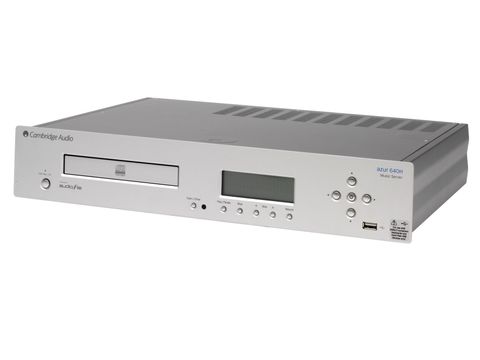TechRadar Verdict
Setup can be a hassle, but all those troubles melt away when you hear it in action
Pros
- +
Excellent music performance
Cons
- -
Difficult network setup
Why you can trust TechRadar
The Azur 640H follows in the footsteps of Cambridge Audio's acclaimed CD players but adds a capacious 160GB internal hard drive to centralise your entire music collection.
Slip in a CD, and the 640H rips audio tracks. It can accommodate around 30,000 compressed music (MP3) tracks, which should be enough for those with an extensive music library, or 3,000 uncompressed music tracks. It takes a tedious 20 minutes to rip and store a CD using any of the five compression levels, though.
Compress to play
Enabling the background compression mode provides quicker transfers, taking around seven minutes to store a 50-minute album, and then compresses tracks overnight while the unit is in standby.
You can choose different compression formats for each CD to manage storage capacity, as well as create playlists and burn compilations to recordable discs. The 640H can access music stored on a PC or Mac as well as stream internet radio stations and retrieve music database information.
You can even hook up an MP3 player via the various USB ports and transfer music from it. Disappointingly, it's not iPod compatible.
Things get tricky with wired or wireless home network setup. The extensive procedure is a devil to master, even with the supplied booklet, but there's a helpful guide on the Cambridge Audio website. Installation complexities are easily forgiven when you hear it in action, and the 640H really sings.
The CD drive is easily as good as the maker's standalone players, and uncompressed music transferred to the hard drive is just as solid (but quickly eats up hard drive capacity).
The 320kbps and 256kbps compression settings are similarly impressive, taking up less storage space with barely any hint of degradation to sound quality. Noticeable quality losses begin with music transferred using the 192kbps setting, and complex tracks from Muse's Origin of Symmetry album are noticeably degraded and compression artefacts are clearly audible. Sadly, the 160kbps and 128kbps settings drop in quality and are unsuitable for music storage.
Access all areas
The 640H music server is an impressive way to centralise and access all your music. Audio quality is respectable if you stick to low compression level settings, but awkward networking, quirky operation and the noisy disc mechanism mean that the Cambridge Audio 640H lacks refinement, and inexperienced users will struggle to get to grips with its full potential.
Tech.co.uk was the former name of TechRadar.com. Its staff were at the forefront of the digital publishing revolution, and spearheaded the move to bring consumer technology journalism to its natural home – online. Many of the current TechRadar staff started life a Tech.co.uk staff writer, covering everything from the emerging smartphone market to the evolving market of personal computers. Think of it as the building blocks of the TechRadar you love today.

